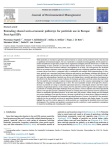Nagesh P., Edelenbosch O.Y., Dekker S.C., de Boer H.J., Mitter H., van Vuuren D.P. (2023). Extending shared socio-economic pathways for pesticide use in Europe: Pest-Agri-SSPs. Journal of Environmental Management, 15/09/2023, vol. 342, p. 1-12.
https://doi.org/10.1016/j.jenvman.2023.118078
https://doi.org/10.1016/j.jenvman.2023.118078
| Titre : | Extending shared socio-economic pathways for pesticide use in Europe: Pest-Agri-SSPs (2023) |
| Auteurs : | P. Nagesh ; O.Y. Edelenbosch ; S.C. Dekker ; H.J. de Boer ; H. Mitter ; D.P. van Vuuren |
| Type de document : | Article |
| Dans : | Journal of Environmental Management (vol. 342, September 2023) |
| Article en page(s) : | p. 1-12 |
| Langues : | Anglais |
| Langues du résumé : | Anglais |
| Catégories : |
Catégories principales 06 - AGRICULTURE. FORÊTS. PÊCHES ; 6.6 - Technique Agricole (sols, engrais, mécanisation)Thésaurus IAMM PESTICIDE ; SYSTEME DE PRODUCTION ; PRODUCTION AGRICOLE ; PRATIQUE AGRICOLE ; POLITIQUE AGRICOLE ; EUROPE |
| Résumé : | While pesticides are essential to agriculture and food systems to sustain current production levels, they also lead to significant environmental impacts. The use of pesticides is constantly increasing globally, driven mainly by a further intensification of agriculture, despite stricter regulations and higher pesticide effectiveness. To further the understanding of future pesticide use and make informed farm-to-policy decisions, we developed Pesticide Agricultural Shared Socio-economic Pathways (Pest-AgriSSPs) in six steps. The Pest-Agri-SSPs are developed based on an extensive literature review and expert feedback approach considering significant climate and socio-economic drivers from farm to continental scale in combination with multiple actors impacting them. In literature, pesticide use is associated with farmer behaviour and practices, pest damage, technique and efficiency of pesticide application, agricultural policy and agriculture demand and production. Here, we developed PestAgri-SSPs upon this understanding of pesticide use drivers and relating them to possible agriculture development as described by the Shared Socio-economic Pathways for European agriculture and food systems (Eur-Agri-SSPs).The Pest-AgriSSPs are developed to explore European pesticide use in five scenarios representing low to high challenges to mitigation and adaptation up to 2050. The most sustainable scenario (Pest-Agri-SSP1) shows a decrease in pesticide use owing to sustainable agricultural practices, technological advances and better implementation of agricultural policies. On the contrary, the Pest-Agri-SSP3 and Pest-Agri-SSP4 show a higher increase in pesticide use resulting from higher challenges from pest pressure, resource depletion and relaxed agricultural policies. Pest-Agri-SSP2 presents a stabilised pesticide use resulting from stricter policies and slow transitions by farmers to sustainable agricultural practices. At the same time, pest pressure, climate change and food demand pose serious challenges. Pest-Agri-SSP5 shows a decrease in pesticide use for most drivers, influenced mainly by rapid technological development and sustainable agricultural practices. However, Pest-Agri-SSP5 also presents a relatively low rise in pesticide use driven by agricultural demand, production, and climate change. Our results highlight the need for a holistic approach to tackle pesticide use, considering the identified drivers and future developments. The storylines and qualitative assessment provide a platform to make quantitative assumptions for numerical modelling and evaluating policy targets. |
| Cote : | En ligne |
| URL / DOI : | https://doi.org/10.1016/j.jenvman.2023.118078 |







